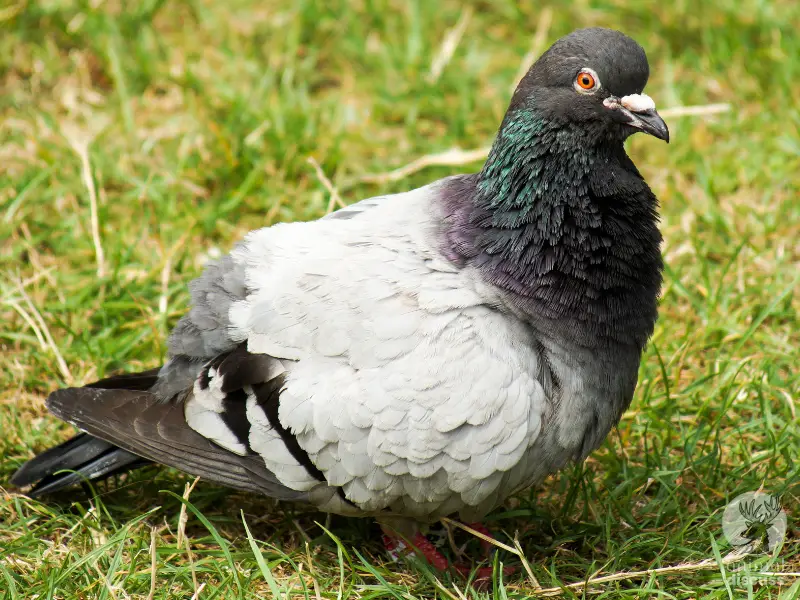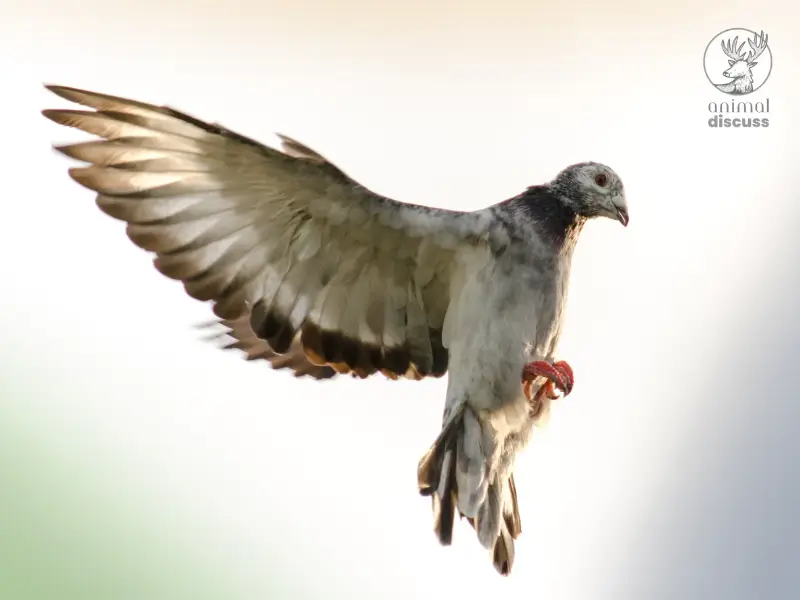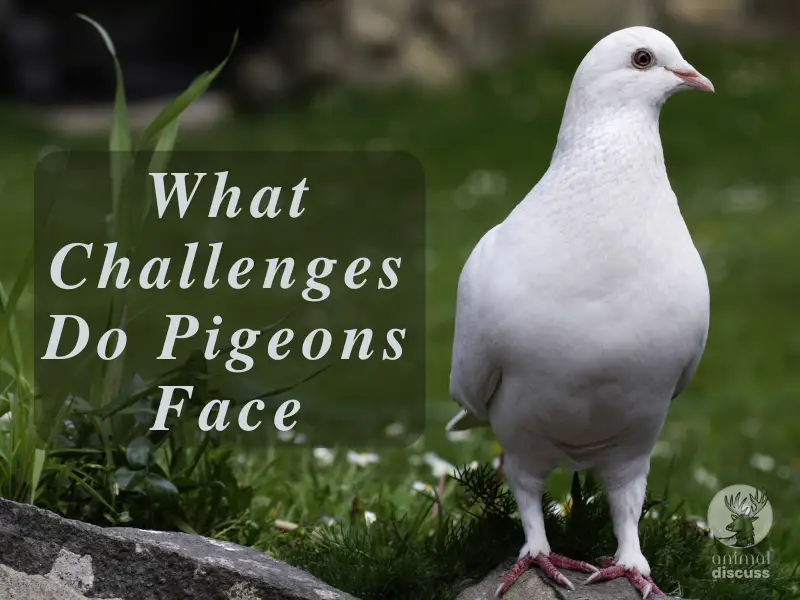This is your ultimate guide to pigeons, covering everything from their scientific classification to their unique behaviors.
Whether you’re curious about their role in history or the challenges they face today, this guide has you covered.
Here, you’ll discover:
- The key differences between domestic and wild pigeons
- How pigeons navigate and thrive in diverse habitats
- The fascinating history of pigeon domestication
- Essential care tips for domestic pigeons
- The threats that impact wild pigeon populations
- Much more
By the end of this guide, you’ll have a comprehensive understanding of these incredible birds and their significance in ecosystems and human culture. Ready to dive in?
Let’s explore the world of pigeons!
Related Articles –
What Are Pigeons?
Pigeons belong to the Columbidae family and are celebrated for their intelligence and homing abilities.

Found in urban areas, forests, and farmlands, they exhibit a wide range of behaviors depending on their environment.
Looking for tips on pet birds? Find the full details here!
Key Differences Between Domestic and Wild Pigeons
| Aspect | Domestic Pigeons | Wild Pigeons |
|---|---|---|
| Habitat | Kept in lofts or aviaries | Found in natural habitats like cliffs and urban settings |
| Diet | Specially formulated grains | Seeds, fruits, and occasional insects |
| Behavior | Docile and accustomed to humans | Independent and wary of predators |
How Many Types of Pigeons Are There?
Pigeons are incredibly diverse, with over 300 species across the globe. These can be broadly classified into domestic and wild types.
Domestic Pigeons
Domestic pigeons have been selectively bred for various purposes, resulting in breeds like:
- Racing Pigeons: Known for speed and endurance in competitive racing.
- Fancy Breeds: Bred for ornamental purposes, such as fantails and Jacobins.
- Utility Pigeons: Raised for meat or other practical uses.
Wild Pigeons
Wild pigeons include:
- Rock Doves (Columba livia): The ancestors of domestic pigeons, commonly seen in cities.
- Band-Tailed Pigeons: Native to North America, residing in forests.
- Passenger Pigeons: An extinct species once native to North America.
What Is the Origin of Pigeons?
The story of pigeons is deeply intertwined with human history. Originating from the rock dove species, these birds were domesticated over 5,000 years ago.
History of Domestication
Humans first domesticated pigeons in the Middle East for food and communication. Over time, they became companions and status symbols.
Evolution of Wild Pigeons
Wild pigeons evolved to adapt to their environments. Their ability to thrive in diverse habitats demonstrates their remarkable resilience.
Why Are Pigeons Important in Human History?
Pigeons have played critical roles in advancing human civilization. From ancient times to modern-day uses, their significance cannot be overstated.

Role in Communication
Pigeons served as messengers in wars and commerce. Their homing ability made them reliable carriers of critical information.
Contribution to Agriculture and Food
Pigeons have been a sustainable food source for centuries. In some cultures, pigeon farming remains a significant practice.
How Do Pigeons Behave?
Behavior in pigeons varies widely depending on whether they are domestic or wild. Both types exhibit unique social and survival strategies.
Social Behavior
Pigeons are highly social, often forming flocks to increase safety. They communicate through cooing sounds and body movements.
Differences in Behavior
Domestic pigeons are more accustomed to human interaction, while wild pigeons rely on keen instincts to evade predators.
Where Do Pigeons Live?
Pigeons are remarkably adaptable and occupy a wide range of habitats. Their choice of location often depends on the availability of food and safety.
Habitats of Wild Pigeons
Wild pigeons typically live in forests, cliffs, and other natural settings. Urban pigeons adapt to city life, nesting on building ledges and bridges.
Dependence of Domestic Pigeons
Domestic pigeons rely on humans for shelter and care. They are often housed in lofts, aviaries, or other controlled environments.
What Do Pigeons Eat?
Diet is a critical aspect of pigeon life, influencing their health and behavior. Both wild and domestic pigeons have specific dietary preferences.
Natural Diet of Wild Pigeons
Wild pigeons feed on seeds, grains, and fruits. They may occasionally consume small insects for protein.
Feeding Habits of Domestic Pigeons
Domestic pigeons are provided with a balanced diet of grains, seeds, and supplements to meet their nutritional needs.
How Do Pigeons Reproduce?
Pigeons are prolific breeders, with unique reproductive behaviors that ensure the survival of their species.
Breeding and Nesting Habits
Both wild and domestic pigeons build nests using twigs and leaves. They typically lay two eggs, incubating them for about 18 days.
Differences in Reproduction
Domestic pigeons often have controlled breeding programs, while wild pigeons mate seasonally, depending on environmental conditions.
What Makes Pigeons Unique?
Pigeons possess several extraordinary traits that set them apart from other birds.
- Homing Instinct: One of their most remarkable abilities is their navigation skill, allowing them to find their way home from vast distances.
- Lifespan and Resilience: Pigeons can live up to 15 years in captivity, showcasing resilience and adaptability across environments.
What Challenges Do Pigeons Face?
Despite their adaptability, pigeons face numerous threats, both natural and human-induced.

Predators and Threats to Wild Pigeons
Wild pigeons often fall prey to birds of prey, cats, and other predators. Habitat loss also poses a significant risk.
Issues Faced by Domestic Pigeons
Domestic pigeons may suffer from diseases and require consistent care to thrive in captivity.
How Can Pigeons Be Protected?
Protecting pigeons ensures the survival of both wild populations and domesticated breeds.
Conservation Efforts: Efforts include preserving natural habitats and preventing the illegal capture of wild pigeons.
Care Guidelines for Domestic Pigeons: Owners must provide proper shelter, a balanced diet, and regular veterinary check-ups for their birds.
Final Words
Pigeons are far more than just common birds. They’ve played crucial roles in human history, from communication to agriculture.
Understanding the differences between domestic and wild pigeons reveals the incredible adaptability of these birds, thriving in both human-made and natural environments.
Whether you’re raising pigeons as pets or observing wild ones, there’s no denying their resilience and value in ecosystems around the world. Pigeons are truly remarkable creatures.

